|
|
|
Sort Order |
|
|
|
Items / Page
|
|
|
|
|
|
|
| Srl | Item |
| 1 |
ID:
131832
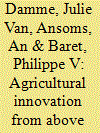

|
|
|
|
|
| Publication |
2014.
|
| Summary/Abstract |
In its 2008 World Development Report, the World Bank pleaded for a 'Green Revolution' for sub-Saharan Africa, pointing particularly to the importance of including smallholder farmers. This article focuses on the banana cropping system in Rwanda, and on the agricultural innovations introduced within this system. We first consider macro-level innovations that are designed to promote a modernized agricultural sector and that correspond to the rationale of the Green Revolution. We analyse how such 'top-down' innovations are received on the ground and show how smallholders seek to evade new government policies when they fail to reflect local economic and social realities. This demonstrates how some rural Rwandans are challenging the authority of the government in disguised ways in order to protect their local livelihoods. The Rwandan experience should inspire continent-wide Green Revolution policies to take account of the risk-coping rationale of small-scale farmers and their capacity to innovate 'from below'.
|
|
|
|
|
|
|
|
|
|
|
|
|
|
|
|
| 2 |
ID:
132333


|
|
|
|
|
| Summary/Abstract |
The ambition of this special issue is to contribute to contemporary scholarly analyses of border security by bringing more focus onto a specific field of inquiry: the practices of the plurality of power-brokers involved in the securing of borders. Border security is addressed from the angle of the everyday practices of those who are appointed to carry it out; considering border security as practice is essential for shedding light on contemporary problematizations of security. Underscoring the methodological specificity of fieldwork research, we call for a better grounding of scholarship within the specific agencies intervening in bordering spaces in order to provide detailed analyses of the contextualized practices of security actors.
|
|
|
|
|
|
|
|
|
|
|
|
|
|
|
|
| 3 |
ID:
132334
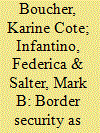

|
|
|
|
|
| Publication |
2014.
|
| Summary/Abstract |
The ambition of this special issue is to contribute to contemporary scholarly analyses of border security by bringing more focus onto a specific field of inquiry: the practices of the plurality of power-brokers involved in the securing of borders. Border security is addressed from the angle of the everyday practices of those who are appointed to carry it out; considering border security as practice is essential for shedding light on contemporary problematizations of security. Underscoring the methodological specificity of fieldwork research, we call for a better grounding of scholarship within the specific agencies intervening in bordering spaces in order to provide detailed analyses of the contextualized practices of security actors.
|
|
|
|
|
|
|
|
|
|
|
|
|
|
|
|
| 4 |
ID:
131435
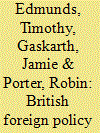

|
|
|
|
|
| Publication |
2014.
|
| Summary/Abstract |
In July 2013, Chatham House hosted a workshop under the auspices of the Global Insecurities Centre of the University of Bristol and the British Foreign Policy Working Group of the British International Studies Association, to explore these challenges. Four of the papers presented at that conference have been chosen for this special selection.
|
|
|
|
|
|
|
|
|
|
|
|
|
|
|
|
| 5 |
ID:
131437
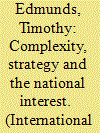

|
|
|
|
|
| Publication |
2014.
|
| Summary/Abstract |
British strategy-making has been subject to a sustained critique in recent years, from parliamentarians, retired members of the armed forces and scholars of strategic studies. This article examines the nature of this critique and the evolving character of strategic practice in Britain. It argues that the criticisms of British strategymaking are often misplaced, for two main reasons. First, many base their critique on a reductionist notion of unitary 'national interest' that fails to capture systemic patterns of complexity and contestation in the wider security environment and in Britain. Second, they underestimate or ignore the extent to which the UK strategic community is itself innovating in response to these themes, particularly since the 2010 Strategic Defence and Security Review. This is not to argue that considerable challenges do not remain for strategy-making in Britain. Most notably, these include: how to translate strategic innovation in departments and elsewhere into a coherent national strategic agenda; how to do this while maintaining institutional coordination and a shared sense of strategic purpose across government (and beyond); how to sustain and consolidate institutional expertise and experience in a rapidly changing civil service and at a time of continuing public austerity; and how to articulate and legitimate security policy decisions among a general public that is both disengaged from elite strategic discourse and sceptical of the efficacy of military force. Even so, the article concludes by arguing that it is possible to see the outline of an emergent and distinctive theory of action in contemporary British strategic practice, characterized by principles of adaptivity, anticipation, self-organisation and nascent cross-governmentalism.
|
|
|
|
|
|
|
|
|
|
|
|
|
|
|
|
| 6 |
ID:
132630


|
|
|
|
|
| Publication |
2014.
|
| Summary/Abstract |
The recent low CO2 prices in the European Union Emission Trading Scheme (EU ETS) have triggered a discussion whether the EU ETS needs to be adjusted. We study the effects of CO2 price floors and a price ceiling on the dynamic investment pathway of two interlinked electricity markets (loosely based on Great Britain, which already has introduced a price floor, and on Central Western Europe). Using an agent-based electricity market simulation with endogenous investment and a CO2 market (including banking), we analyse the cross-border effects of national policies as well as system-wide policy options.
A common, moderate CO2 auction reserve price results in a more continuous decarbonisation pathway. This reduces CO2 price volatility and the occurrence of carbon shortage price periods, as well as the average cost to consumers. A price ceiling can shield consumers from extreme price shocks. These price restrictions do not cause a large risk of an overall emissions overshoot in the long run. A national price floor lowers the cost to consumers in the other zone; the larger the zone with the price floor, the stronger the effect. Price floors that are too high lead to inefficiencies in investment choices and to higher consumer costs.
|
|
|
|
|
|
|
|
|
|
|
|
|
|
|
|
| 7 |
ID:
130999


|
|
|
|
|
| Publication |
2014.
|
| Summary/Abstract |
We examine the degree to which national political setting, namely domestic political opportunity structures, influences the transnational activities of women's groups in the United Kingdom, France, and Germany. The literature suggests that social groups are more likely to choose international activity when national institutions provide fewer opportunities for domestic activity (Keck and Sikkink 1998; della Porta and Tarrow 2005). Using data about women's groups' activity from a content analysis of news wires from 1980 to 2008, we conclude that women's groups act in the domestic sphere significantly more than they act in the international arena-even when acting on transnational issues-and that groups choose international action when domestic opportunities are less hospitable to group action. Thus, we argue that the domestic sphere continues to be a major influence on social movement activity even as globalization and transnationalism increase.
|
|
|
|
|
|
|
|
|
|
|
|
|
|
|
|
| 8 |
ID:
131486
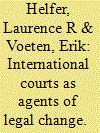

|
|
|
|
|
| Publication |
2014.
|
| Summary/Abstract |
Do international court judgments influence the behavior of actors other than the parties to a dispute? Are international courts agents of policy change or do their judgments merely reflect evolving social and political trends? We develop a theory that specifies the conditions under which international courts can use their interpretive discretion to have system-wide effects. We examine the theory in the context of European Court of Human Rights (ECtHR) rulings on lesbian, gay, bisexual, and transgender (LGBT) issues by creating a new data set that matches these rulings with laws in all Council of Europe (CoE) member states. We also collect data on LGBT policies unaffected by ECtHR judgments to control for the confounding effect of evolving trends in national policies. We find that ECtHR judgments against one country substantially increase the probability of national-level policy change across Europe. The marginal effects of the judgments are especially high where public acceptance of sexual minorities is low, but where national courts can rely on ECtHR precedents to invalidate domestic laws or where the government in power is not ideologically opposed to LGBT equality. We conclude by exploring the implications of our findings for other international courts.
|
|
|
|
|
|
|
|
|
|
|
|
|
|
|
|
| 9 |
ID:
130271
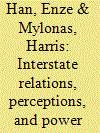

|
|
|
|
|
| Publication |
2014.
|
| Summary/Abstract |
Why do multi-ethnic states treat various ethnic groups differently? How do ethnic groups respond to these state policies? We argue that interstate relations and ethnic group perceptions about the relative strength of competing states are important-but neglected-factors in accounting for the variation in state-ethnic group relations. In particular, whether an ethnic group is perceived as having an external patron matters a great deal for the host state's treatment of the group. If the external patron of the ethnic group is an enemy of the host state, then repression is likely. If it is an ally, then accommodation ensues. Given the existence of an external patron, an ethnic group's response to a host state's policies depends on the perceptions about the relative strength of the external patron vis-à-vis the host state and whether the support is originating from an enemy or an ally of the host state. We present five configurations and illustrate our theoretical framework on the eighteen largest ethnic groups in China from 1949 to 1965, tracing the Chinese government's policies toward these groups, and examine how each group responded to these various nation-building policies.
|
|
|
|
|
|
|
|
|
|
|
|
|
|
|
|
| 10 |
ID:
130186
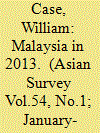

|
|
|
|
|
| Publication |
2014.
|
| Summary/Abstract |
The most important event to take place in Malaysia during 2013 was its general election. The incumbent National Front government was returned to power, though with less than a majority of the popular vote. The government then rewarded Malay supporters with new affirmative action programs. It also repulsed an armed incursion into Sabah launched from the southern Philippines.
|
|
|
|
|
|
|
|
|
|
|
|
|
|
|
|
| 11 |
ID:
128271


|
|
|
|
|
| Publication |
2014.
|
| Summary/Abstract |
In recent years, the relationship between the media and the foreign policy-making process in China has become more interactive and even a typical symbiosis. This paper attempts to conduct preliminary research on this very dynamic and changing relationship in the context of Sino-Japan relations. It argues that the Chinese media helps shape the agenda for foreign policy makers, narrow down the set of policy options, change the pace of policy making and implementation, and influence the direction of the final decision. Yet more often than not, the government still controls and regulates the reporting by the media on foreign policy issues. Once the media is perceived as going too far, the government never hesitates to rein it in through various internal and external mechanisms.
|
|
|
|
|
|
|
|
|
|
|
|
|
|
|
|
| 12 |
ID:
131781


|
|
|
|
|
| Publication |
2014.
|
| Summary/Abstract |
Drawing on comparisons with cooperative and competitive non-state health care provision around the world, this article analyses non-state provision of health services in post-Soviet Uzbekistan and Kazakhstan. It explores the conditions in which non-state provisions remain cooperative or become politicised and contrasts the relations between NGOs and the state in Uzbekistan and Kazakhstan and the way they became politicised in the Middle East. In contrast to Western conceptions of NGOs, Central Asia's health NGOs cooperate with state agencies to serve their constituencies. In contrast to the perceptions of Central Asian governments, health-oriented NGOs do not aim to politicise health care. Donor support to Central Asia's health NGOs has created civically oriented actors that fill gaps in the state's capacity and enable governments to better serve their populations.
|
|
|
|
|
|
|
|
|
|
|
|
|
|
|
|
| 13 |
ID:
131436
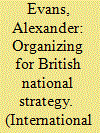

|
|
|
|
|
| Publication |
2014.
|
| Summary/Abstract |
In December 1968 Ernest May asked how the US government could gain access to 'long-headed' staffers to provide greater strategic depth to foreign policy. The challenge of long-term strategy persists: how should government be organized to support it, how can the right people be found to staff it and how can political leaders make time for longer-term policy-making given the challenge of the immediate? The policy planning staff in the Foreign and Commonwealth Office have traditionally had the task of supporting longer-range, broader foreign policy. A small group of diplomats-later leavened by externals from the media, non-profit and private sectors-was meant to generate an improved approach to British interests and policy. As Robert Wade-Gery recalls of its role in the 1960s, there was a push to forge fresh links with outside thinking. Did it work? Former policy planners can be circumspect about its achievements. One former British planner said he felt like 'a spare part rattling around in a tin', while former American planners have written about the challenge of injecting fresh thinking when detached from decision-making. Other planners were dragged into operational work or speechwriting. Many planners nonetheless enjoyed the opportunity to think more broadly. Policy planning can be intellectually rich without being the source of actionable strategic thinking about the long-term national interest. This article suggests that a greater focus on people rather than systems might help to foster more strategic, anticipatory and innovative thinking about the national interest.
|
|
|
|
|
|
|
|
|
|
|
|
|
|
|
|
| 14 |
ID:
128096
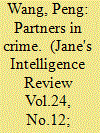

|
|
|
|
|
| Publication |
2012.
|
| Summary/Abstract |
Triads from Hong Kong and Taiwan have moved some of their operations to mainland China to take advantage of its booming economy and less stringent policing. Peng Wang examines the security challenge of the groups mainlandisation.
|
|
|
|
|
|
|
|
|
|
|
|
|
|
|
|
| 15 |
ID:
128279
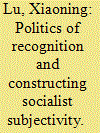

|
|
|
|
|
| Publication |
2014.
|
| Summary/Abstract |
Adopting an historical approach, this essay reexamines the national minority films produced between 1949 and 1966 in socialist China with a focus on its role in the Chinese Communist Party's political project of building an ideal socialist citizenry. Shifting the critical anchoring of the national minority film from questions of representation to those of performance and spectatorship, it points out that cross-ethnic performance embedded within film narrative and discerned by historically situated audiences simultaneously constructs and deconstructs ethnicity, thus encouraging a transformative recognition across the ethnic boundary. Ultimately the national minority film models fraternity of citizenship essential to creating socialist subjectivity.
|
|
|
|
|
|
|
|
|
|
|
|
|
|
|
|
| 16 |
ID:
154419
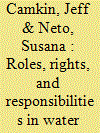

|
|
|
|
|
| Summary/Abstract |
Numerous commentators have highlighted the criticality of improving water governance to help address current and future water challenges. But whose job is it? In water governance, what should we expect from our governments? What should commercial water users expect from each other? What changes should environmental and social advocates expect as a result of their representations on behalf of stakeholders who have little or no voice? And what should governments expect from the communities they serve? This article briefly examines the rights and responsibilities of various actors in water governance through a selection of key water issues. We suggest that discussions about water are often unbalanced, overemphasizing the rights of large water users and underemphasizing the responsibilities all parties have toward achieving effective and efficient water governance. Among all the responsibilities in water governance, none is more fundamental than our shared responsibility toward intergenerational equity. This shared responsibility can and should be the rallying point around which we gather to improve water decisions at all scales, from local streams to national policies and global agreements.
|
|
|
|
|
|
|
|
|
|
|
|
|
|
|
|
| 17 |
ID:
127762
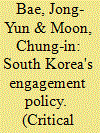

|
|
|
|
|
| Publication |
2014.
|
| Summary/Abstract |
During the progressive decade of the Kim Dae-jung and Roh Moo-hyun governments (1998-2007), South Korea actively pursued an engagement policy with North Korea that aimed to facilitate de facto unification by means of exchanges and cooperation, trust-building, and peaceful coexistence. But the engagement policy has been subject to harsh criticism for its silence over human rights conditions in North Korea. This article looks into the nature of conservative critiques of the engagement policy on the human rights front and elucidates how its proponents have responded. Attention is given to how the trade-off between peace and human rights, as well as that between basic human needs and human rights, constrained their open pursuit of a human rights campaign against North Korea. Also examined is their belief that democracy and human rights should not be imposed from the outside and that North Koreans should win them through struggle from within. For conservatives, hard-line pressures are of limited utility, and opening and reform, the introduction of market system, the expansion of civil society, and the advent of the middle class through the engagement policy are the best ways, albeit time consuming, to enhance human rights and democracy in the North. Finally, the authors critically assess recent debates on the North Korean Human Rights Act in the South Korea's National Assembly as a way of exploring the limits and promise of the engagement policy.
|
|
|
|
|
|
|
|
|
|
|
|
|
|
|
|
| 18 |
ID:
131439
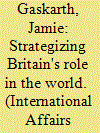

|
|
|
|
|
| Publication |
2014.
|
| Summary/Abstract |
In recent commentaries on British foreign policy, the New Labour and coalition governments have been criticized for lacking strategic thinking. Academics describe a 'strategy gap' and note that old ideas about Britain's role in the world, such as Churchill's 1948 reference to 'three circles', continue to be recycled. Parliamentarians bemoan the 'uncritical acceptance of these assumptions' that has led to 'a waning of our interests in, and ability to make, National Strategy'. This article argues that a primary problem has been the lack of consideration of how identity, strategy and action interrelate in foreign policy. Using the insights of role theory, the article seeks to address this by outlining six ideal-type role orientations that the UK might fulfil in world politics, namely: isolate, influential (rule of law state), regional partner, thought leader, opportunist-interventionist power and Great Power. By considering how variations in a state's disposition towards the external environment translate into different policy directions, the article aims both to highlight the range of roles available to policy-makers and to emphasize that policy often involves making a choice between them. Failure to recognize this has resulted in role conflicts and policy confusion. In setting out a variety of different role orientations, the author offers a route to introducing a genuine strategic sensibility to policy-making, one that links identity with policy goals and outcomes.
|
|
|
|
|
|
|
|
|
|
|
|
|
|
|
|
| 19 |
ID:
193094


|
|
|
|
|
| Summary/Abstract |
This article analyses the evolution and interplay of national policies and international diplomacy on cyber terrorism within and across the UNSC’s permanent five members and the UN process on cyber norms (GGE and OEWG). First, it reveals how – through the extension of preemptive measures to low-impact cyber activities and online content – national policies progressively articulate cyber terrorism as an issue of information security. Second, it problematizes how – through the adoption of comprehensive and imprecise definitions – the diplomatic language on cyber terrorism might lend international support to those authoritarian regimes keen on leveraging counter-terrorism to persecute domestic oppositions and vulnerable groups. Third, it concludes that – with UN diplomatic efforts increasingly discussing countering (dis)information operations – combining normative debates on cyber terrorism with those on information security requires precision of language to safeguard human rights globally.
|
|
|
|
|
|
|
|
|
|
|
|
|
|
|
|
| 20 |
ID:
131438
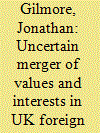

|
|
|
|
|
| Publication |
2014.
|
| Summary/Abstract |
How should ethics and values relate to the British national interest? The idea that ethical commitments to distant non-citizens should occupy a position within British foreign policy was a controversial element of Labour's foreign policy during the early part of their 1997-2010 tenure. Rather than undermining traditional national interest concerns, one of the defining themes within Labour's foreign policy was that values and national interests were becoming increasingly merged in a globalized world. The post-2010 coalition government has made distinct efforts to differentiate themselves from their predecessors, crafting a more pragmatic and national interest-based foreign policy approach. Despite this, significant continuities with Labour's 'ethical dimension' are evident and many associated policies and practices have survived the transition. Moreover, the suggestion that British values and interests are interrelated and mutually reinforcing has been re-asserted, with renewed vigour, by coalition policy-makers. The article traces the ways in which values and interests have become increasingly merged in the language of recent British foreign policy and examines the implications for our understanding of the UK's national interest. It argues that the idea of an almost symbiotic relationship between values and interests is fundamentally unhelpful and makes the case for greater disaggregation of the two. Although a zero-sum game need not exist between core national interests and ethical obligations abroad, the suggestion that they are mutually reinforcing obscures the tensions that frequently arise between these different realms of obligation. Using the examples of failed state stabilization and UK arms trade regulation, the article demonstrates how uncritical acceptance of the values-interests merger risks producing unstable policy formulations.
|
|
|
|
|
|
|
|
|
|
|
|
|
|
|
|
|
|
|
|
|